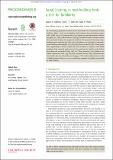Files in this item
Social learning in nest-building birds : a role for familiarity
Item metadata
| dc.contributor.author | Guillette, Lauren Mary | |
| dc.contributor.author | Scott, Alice C Y | |
| dc.contributor.author | Healy, Susan Denise | |
| dc.date.accessioned | 2016-03-28T11:03:39Z | |
| dc.date.available | 2016-03-28T11:03:39Z | |
| dc.date.issued | 2016-03 | |
| dc.identifier | 241184159 | |
| dc.identifier | 840469cc-1770-46ab-8046-93350c6ad5bf | |
| dc.identifier | 27009230 | |
| dc.identifier | 84961619717 | |
| dc.identifier | 27009230 | |
| dc.identifier | 000375732500019 | |
| dc.identifier.citation | Guillette , L M , Scott , A C Y & Healy , S D 2016 , ' Social learning in nest-building birds : a role for familiarity ' , Proceedings of the Royal Society B: Biological Sciences , vol. 283 , no. 1827 , 20152685 . https://doi.org/10.1098/rspb.2015.2685 | en |
| dc.identifier.issn | 0962-8452 | |
| dc.identifier.other | ORCID: /0000-0002-8059-4480/work/60631270 | |
| dc.identifier.uri | https://hdl.handle.net/10023/8498 | |
| dc.description | © 2016 The Author(s). | en |
| dc.description.abstract | It is becoming apparent that birds learn from their own experiences of nest building. What is not clear is whether birds can learn from watching conspecifics build. As social learning allows an animal to gain information without engaging in costly trial-and-error learning, first-time builders should exploit the successful habits of experienced builders. We presented first-time nest-building male zebra finches with either a familiar or an unfamiliar conspecific male building with material of a colour the observer did not like. When given the opportunity to build, males that had watched a familiar male build switched their material preference to that used by the familiar male. Males that observed unfamiliar birds did not. Thus, first-time nest builders use social information and copy the nest material choices when demonstrators are familiar but not when they are strangers. The relationships between individuals therefore influences how nest-building expertise is socially transmitted in zebra finches. | |
| dc.format.extent | 418376 | |
| dc.language.iso | eng | |
| dc.relation.ispartof | Proceedings of the Royal Society B: Biological Sciences | en |
| dc.subject | Nest building | en |
| dc.subject | Cognition | en |
| dc.subject | Birds | en |
| dc.subject | Social learning | en |
| dc.subject | Physical cognition | en |
| dc.subject | QH301 Biology | en |
| dc.subject.lcc | QH301 | en |
| dc.title | Social learning in nest-building birds : a role for familiarity | en |
| dc.type | Journal article | en |
| dc.contributor.sponsor | BBSRC | en |
| dc.contributor.sponsor | BBSRC | en |
| dc.contributor.sponsor | The Royal Society | en |
| dc.contributor.institution | University of St Andrews. School of Biology | en |
| dc.contributor.institution | University of St Andrews. Institute of Behavioural and Neural Sciences | en |
| dc.contributor.institution | University of St Andrews. Centre for Social Learning & Cognitive Evolution | en |
| dc.contributor.institution | University of St Andrews. Centre for Biological Diversity | en |
| dc.identifier.doi | 10.1098/rspb.2015.2685 | |
| dc.description.status | Peer reviewed | en |
| dc.identifier.grantnumber | BB/M013944/1 | en |
| dc.identifier.grantnumber | BB/I019502/1 | en |
| dc.identifier.grantnumber | NF120136 | en |
This item appears in the following Collection(s)
Items in the St Andrews Research Repository are protected by copyright, with all rights reserved, unless otherwise indicated.

